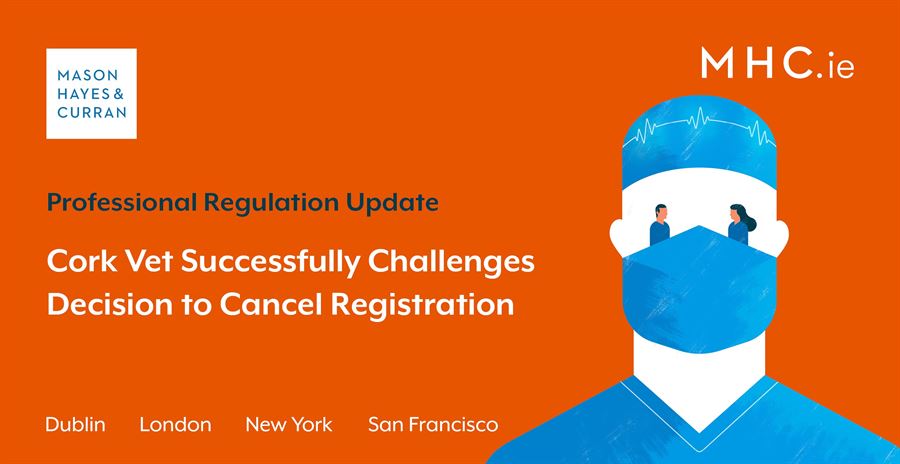
Cork vet Daniel McCarthy has been successful in having a decision of the Veterinary Council of Ireland (VCI) regarding his fitness to practise set aside. In 2019, the VCI’s Fitness to Practise Committee (Committee) found that Mr McCarthy was unfit to work as a vet. It was recommended that his registration with the VCI be cancelled.
By agreement between Mr McCarthy and the VCI, that decision has now been set aside. Mr McCarthy’s case will go back before a new Committee to be considered afresh. The case provides an interesting insight to the measures open to practitioners when faced with potential sanctions on their practice. It also highlights the guidance professional regulators should follow when making decisions.
Allegations
The allegations against Mr McCarthy were that he had dispensed prescription only animal medications to animals not under his care and dispensed prescription only medications without prescriptions. It was also alleged that he failed to produce documentation to an authorised official. Before the Committee hearing began, Mr McCarthy accepted the allegations. He agreed to witness statements being read into the record, meaning that witnesses did not appear in person. Following the hearing, the Committee produced a report providing their decision and recommendations. Mr McCarthy then judicially reviewed the decision, asking that it be set aside. In particular, Mr McCarthy took issue with what he said were incorrect references to serious medications. He said this made the Committee’s findings erroneous. Mr McCarthy also disagreed with the taking out of context of witness evidence.
Powers of the President of the High Court
Where decisions of the VCI are concerned, the President of the High Court can either confirm or set aside the decision made. She can also return the decision to the VCI to be reconsidered, or make any other order she considers appropriate. This contrasts with the President’s powers regarding decisions of healthcare regulators like the Nursing and Midwifery Board of Ireland, the Medical Council, and CORU. In these instances, the President must confirm those decisions, unless she sees good reason not to do so.
However, before the decision comes before the President, a registered professional may appeal the decision to the High Court within 21 days of being notified of it. Alternatively, as in this case, the registrant may apply to the High Court for a judicial review of the Committee’s decision. The registrant may do so if, for example, they believe there was a flaw in the process followed in reaching the decision.
Judicial review
Judicial review proceedings consider the way in which a decision was arrived at. The High Court has the power to set aside a decision where, for example, it considers that the body making the decision did not have the legal power to make it. The High Court may also set aside a decision where it believes it was arrived at using improper procedures. Finally, a decision may be set aside where the High Court finds it to be so irrational that it could not have been made by someone acting reasonably.
Mr McCarthy also brought an application for further and better particulars in the context of his judicial review challenge. This was heard by Mr Justice MacGrath in the High Court, with judgment delivered on 27 February last. The position of the VCI in relation to Mr McCarthy’s judicial review proceedings is detailed in Mr Justice McGrath’s decision. In response to Mr McCarthy’s claims, the VCI argued that incorrect references to medications had no material bearing on the Committee’s decision. It was said that the incorrect references were only typos or mistaken references. The VCI stated that Mr McCarthy’s acceptance of the content of the statements, and his agreement to that becoming evidence at the hearing, a reasonably common practice, meant it was not open to him to challenge the evidence later.
The judicial review hearing opened before Mr Justice Garrett Simmons on 20 April 2021. However, following a recommendation by the judge, the case was adjourned to allow for discussions between representatives for Mr McCarthy and the VCI.
Following these talks, an agreement was reached that the findings and recommendations made in relation to Mr McCarthy could be set aside. He will now go back before the Committee where the inquiry will be heard afresh.
Conclusion
While this case was resolved by agreement, had Mr McCarthy’s arguments been considered by the High Court, it seems likely that the result for him would be similar.
The President of the High Court has strongly emphasised that the strength of applications to confirm sanctions proposed by a regulatory body lies in the rationale for the decision provided by the Committee and endorsed by the council or board concerned. The President can refuse to confirm a decision she feels was unreasonably reached. Fitness to practise committees, and the boards and councils considering their decisions should be mindful to show that decisions were reached rationally. They must also show decisions were made with proper, and accurate, consideration of the whole case. This is important both at the point of decision-making, and in the communication of these decisions, to protect them as far as possible from potential challenges.
For more information, contact a member of our Professional Regulatory & Disciplinary team.
The content of this article is provided for information purposes only and does not constitute legal or other advice.






